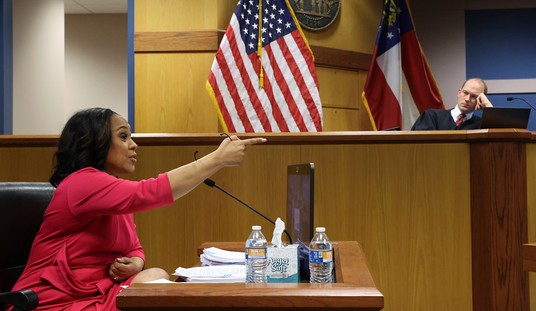Robert Kagan, writing in a Washington Post article entitled “Obama, Siding With the Regime” makes the point expressed in the post Follow the Money, but in a more scholarly and better documented way. In that post I wrote that Obama was a man with deals waiting to go forward in Iran. From that point of view, the current revolt against the regime was an unwelcome inconvenience awaiting only a “decent interval” to forget.
But despite the global revulsion to their brutal crackdown, the Ayatollah’s aren’t finished yet. The hook in Obama’s throat has gone in deep. Washington is as invested in engagement as the Ayatollahs are because it is the cornerstone of the Administration’s plan to remake the Middle East. That plan is based on the idea that it is better to buy off Teheran than to fight it. And on that buyoff going forward depends a number of things ranging from the Israeli-Palestinian roadmap to Iraq and Afghanistan. The state of play, amoral as it is, was succintly expressed in Roger Cohen’s advice to Obama in the NYT: “I’ve argued for engagement with Iran and I still believe in it, although, in the name of the millions defrauded, President Obama’s outreach must now await a decent interval.” It’s not a question of if, but when.
Kagan, I think, reaches the same basic conclusion, arguing that Obama is already implicitly committed not to take the side of the regime’s opponents.
In his opening diplomatic gambit, his statement to Iran on the Persian new year in March, Obama went out of his way to speak directly to Iran’s rulers, a notable departure from George W. Bush’s habit of speaking to the Iranian people over their leaders’ heads. As former Clinton official Martin Indyk put it at the time, the wording was carefully designed “to demonstrate acceptance of the government of Iran.” This approach had always been a key element of a “grand bargain” with Iran. The United States had to provide some guarantee to the regime that it would no longer support opposition forces or in any way seek its removal.
With that Rubicon crossed, it will be difficult for the administration to turn back. Kagan believes that President Obama is slowly deflating the opposition, to defeat it without giving the appearance so that his negotiations with Ahmadinejad can go forward.
But Obama’s calculations are quite different. Whatever his personal sympathies may be, if he is intent on sticking to his original strategy, then he can have no interest in helping the opposition. His strategy toward Iran places him objectively on the side of the government’s efforts to return to normalcy as quickly as possible, not in league with the opposition’s efforts to prolong the crisis. … Obama’s policy now requires getting past the election controversies quickly so that he can soon begin negotiations with the reelected Ahmadinejad government. This will be difficult as long as opposition protests continue and the government appears to be either unsettled or too brutal to do business with. What Obama needs is a rapid return to peace and quiet in Iran, not continued ferment. His goal must be to deflate the opposition, not to encourage it. And that, by and large, is what he has been doing.
If you find all this disturbing, you should. The worst thing is that this approach will probably not prevent the Iranians from getting a nuclear weapon. But this is what “realism” is all about. It is what sent Brent Scowcroft to raise a champagne toast to China’s leaders in the wake of Tiananmen Square. It is what convinced Gerald Ford not to meet with Alexander Solzhenitsyn at the height of detente. Republicans have traditionally been better at it than Democrats — though they have rarely been rewarded by the American people at the ballot box, as Ford and George H.W. Bush can attest. We’ll see whether President Obama can be just as cold-blooded in pursuit of better relations with an ugly regime, without suffering the same political fate.
However I disagree with Kagan’s parallel between the Iranian students and the victims of Tienanmen Square. The Chinese were not at the time in a state of undeclared war with the United States nor were they an imminent threat to the stability and safety of a critical region. An Iranian nuclear weapon would almost certainly be met by a Sunni Muslim atomic program and might, in the worst case scenario, lead to a regional nuclear war. Such a war could spread, if only in the form of WMD terrorism, to Europe and America. If Kagan is right in saying that Obama’s sell-out “will probably not prevent the Iranians from getting a nuclear weapon”, then it is the worst of all possible betrayals; one done for essentially nothing. It follows that it fails the test for political realism, but not for political vanity.
That’s the kind of deal that everyone — eventually — may come to rue. And the regrets when they come, will be bitter. Stalin’s executioner, Genrikh Yagoda, a former head of the NKVD was asked by Alexander Orlov if he had reconsidered his belief in God now that he was condemned. Yagoda, then in the Lubyanka awaiting his bullet, replied in the classic words of a man who realized who was on the other side of a Faustian bargain. “From Stalin I deserved nothing but gratitude for my faithful service; from God I deserved the most severe punishment for having violated his commandments thousands of times. Now look where I am and judge for yourself: is there a God, or not…” The current administration may or may not believe in a God; but the first requirement of politics is to be able to recognize the devil.










Join the conversation as a VIP Member